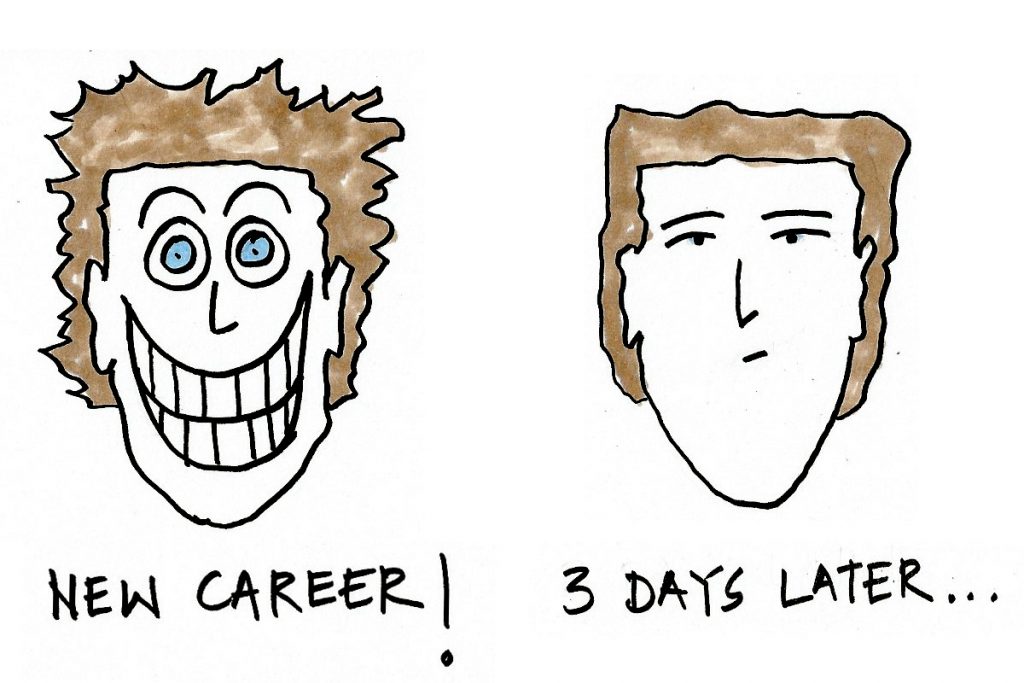Question: At times, we find ourselves getting extremely excited about certain things in our lives. It could be a hobby, social activity, groups of people or even our lives in certain phases. But, as time goes on, we see the motivation and enthusiasm evaporate. Should we be re-kindling the fire somehow or moving on to new things?

Scott:
Maintaining motivation for long periods of time is a myth. All it takes is a little introspection to see that this is obviously true. Motivation is an emotion, and most feelings, no matter how intense, last only for a few hours (or days) at most.
Therefore, what we often perceive as a continuous motivation is really something else. It’s a constant triggering and retriggering of some patterns of behavior that lead to the same feeling. It’s easy to think about this in the context of anxiety. If you feel stressed out by something (say an upcoming exam) you may say that you constantly feel stressed out. But if you were to think about it more carefully, it’s probably more accurate to say that you feel stressed out when you think about the exam. Outside of those thoughts, you have gaps where you think about something else and the feeling goes away.
Because feelings like motivation are ephemeral, I think it’s very difficult to sustain them over the lifetime of a truly ambitious goal or project. Instead you need to think about creating contexts and cues that will trigger the motivation when you need it.
There’s two ways you can do this:
1. Create systems that force you to work
Create systems that force you to work on things even when you don’t “feel like it.” This sounds like self-discipline, but I tend to focus on the systems as being outside yourself rather than a quality of your character. How did you design your goal? Structure your project? If you design these choices well, it can create a tension that moves you forward even when motivation isn’t spontaneous.
2. Leave triggers in your environment
Leave triggers in your environment that will help rekindle that initial motivation. Why did you set out on your goal in the first place? Reminding yourself about the reasons for your motivation systematically can help re-trigger your motivation more than just hoping an initial feeling will last.
Ultimately all our emotions are fickle and fleeting. To accomplish anything outside the status quo requires changing your environment so that those bursts of enthusiasm and discipline become systematic instead of random.
Related:
Do You Use “Lack of Motivation” as an Excuse?
Many people I know tell me that they are not motivated enough to set goals. Discover my reasons why and how you should set goals despite of it.
How to Discover What You’re Passionate About.
Enjoying playing video games isn’t the same as spending thousands of hours designing your own. Your passion has to be something you would work exceptionally hard for. So what do you do, if there is nothing you feel that engaged about?
What Do You Want to Do With Your Life?
What do you want to do with your life? It’s a question almost everyone asks themselves. It’s also a question I don’t believe you should bother asking in the first place.
The Zen of Folding Laundry, and Other Thoughts on Happiness.
How to stop resisting life and accept things.


 I'm a Wall Street Journal bestselling author, podcast host, computer programmer and an avid reader. Since 2006, I've published weekly essays on this website to help people like you learn and think better. My work has been featured in The New York Times, BBC, TEDx, Pocket, Business Insider and more. I don't promise I have all the answers, just a place to start.
I'm a Wall Street Journal bestselling author, podcast host, computer programmer and an avid reader. Since 2006, I've published weekly essays on this website to help people like you learn and think better. My work has been featured in The New York Times, BBC, TEDx, Pocket, Business Insider and more. I don't promise I have all the answers, just a place to start.